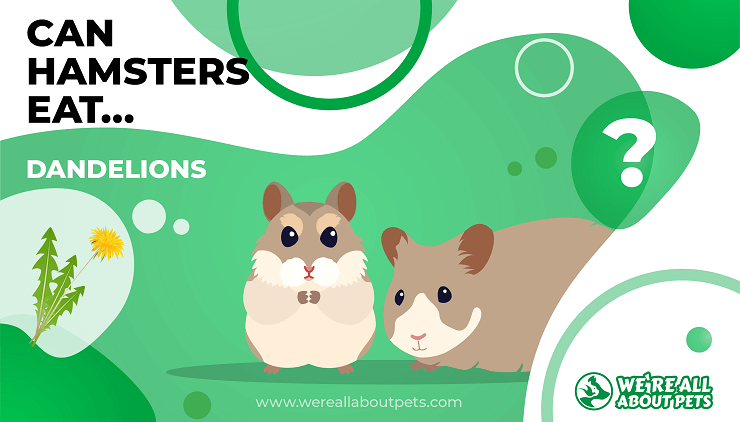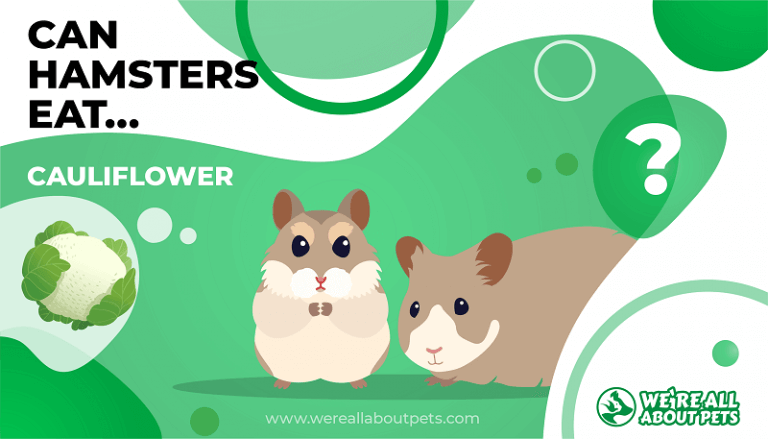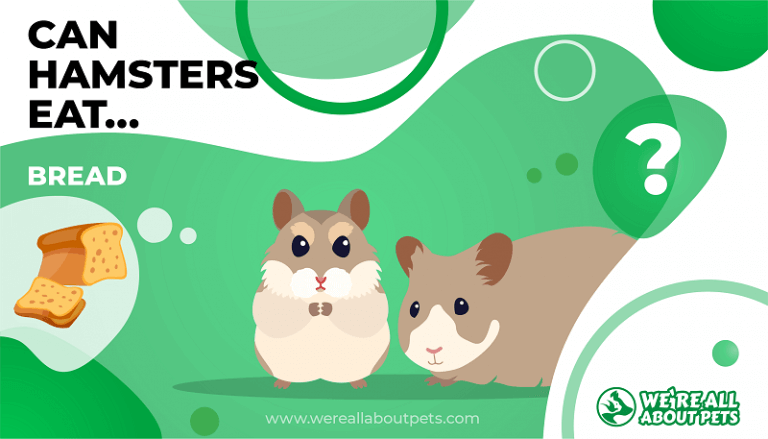Can Hamsters Eat Mushrooms?
This page contains affiliate links. We may earn money or products from the companies mentioned in this post through our independently chosen links, which earn us a commission. Learn More
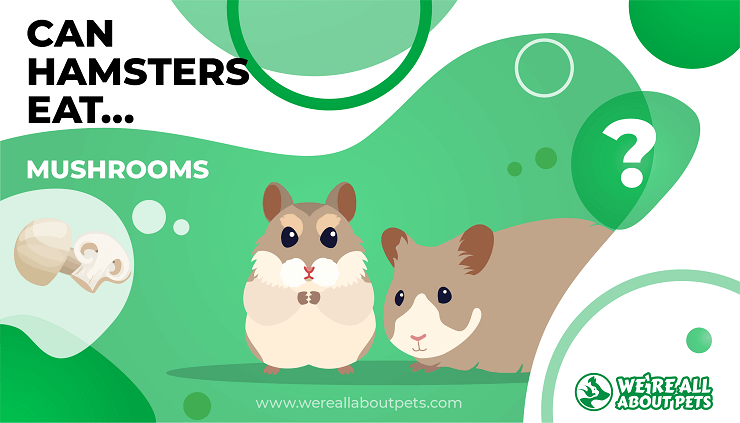
Mushrooms: They’re savory and delicious, and they’re one of the best natural sources of zinc anywhere. With some nice health benefits and so much versatility that they’re easy to add to nearly any meal, it’s easy to see why mushrooms are such a popular culinary choice. But can you share them with your pet?
Can hamsters have mushrooms? If so, how much mushroom can they safely enjoy, and how often can you put mushrooms on your little furball’s menu?
The quick answer (to the first question, anyway) is a tentative no. Some pet parents mention that their hamsters eat mushrooms, while many others join us in preferring to err on the side of caution.
Keep reading for all the facts on mushrooms for hamsters.
Mushroom Nutritional Facts:
Not only are mushrooms a yummy addition to your daily diet, you can have quite a few without blowing your calorie budget.
A 1 cup serving of sliced white mushrooms gives you about:
- 15 calories
- 3 g carbohydrates
- 7 g fiber
- 2 g protein
- .2 g fat
Mushroom Nutrition Stats
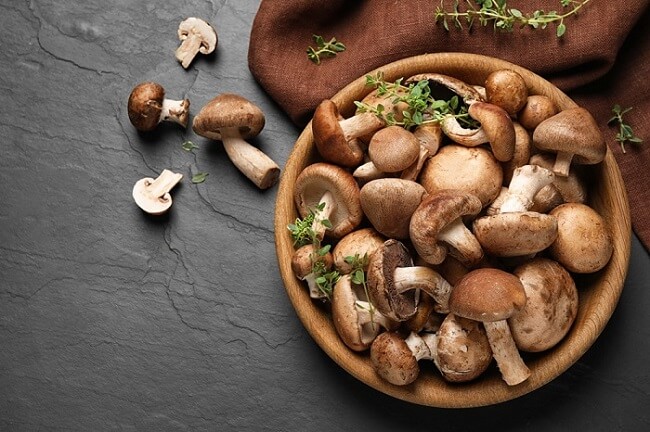
The mushrooms we typically enjoy in things like pasta sauce and soup might not be the most nutritious food – but they do provide a handful of essential nutrients including vitamin D and zinc.
That same 1 cup serving of sliced white mushrooms offers approximately:
- 6 IU vitamin D
- 5 mg vitamin C
- 5 mg niacin
- 2 mcg folate
- 1 mg choline
- 1 mg calcium
- 3 mg magnesium
- 2 mg phosphorus
- 223 mg potassium
- .4 mg zinc
- .2 mg copper
- 5 mcg selenium
Can Hamsters Have Mushrooms?
Some experts say yes, and others say no. Some sources are all for giving hamsters mushrooms – but only the kind you can buy in bulk at the grocery store, i.e. white button mushrooms, cremini mushrooms, and portabella mushrooms. Everyone seems to agree that wild mushrooms present too great a risk.
Our advice? Ask your vet if it’s OK to give your hamster mushroom based on their individual needs, health history, and life stage. It’s best to play things safe.
Are Mushrooms Good For Hamsters?
Not really. Hamsters are native to arid environments and mushrooms aren’t part of their natural diet. There are so many other treats to offer, it’s best to stick with options that are safe, and that your hamster will enjoy with no risk.
Do Hamsters Like Mushrooms?
Since we’ve never given a hamster mushrooms of any kind, we aren’t sure whether hamsters like mushrooms or not. We are planning to follow our own advice and use the mushrooms in our own recipes. In the meantime, we’ll give our hammies cucumber slices to keep them entertained.
How Much Mushroom Can A Hamster Eat?
We’re going to go out on a limb and say “None.” Here’s how much mushroom a to feed your hamster:
| Age | Amount |
| Baby hamster | None |
| Adult hamster | None |
Again, we feel that it just isn’t worth the risk!
How Often Can A Hamster Eat Mushrooms?
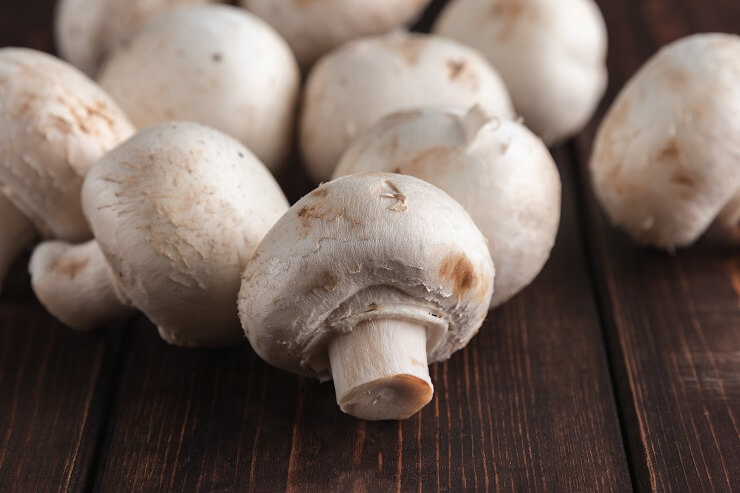
Even though there are sources that state hamsters can eat mushrooms, we haven’t found specific advice from a vet stating that it’s OK to give hamster mushrooms. For this reason, we are going to play it safe and advise you to do the same. It’s our position that hamsters should never eat mushrooms.
The Correct Diet Is Important
Since hamsters shouldn’t eat mushrooms, what can they eat? As it turns out, these little creatures are fierce little omnivores when they’re living in the wild. They are capable of catching and eating large insects such as crickets and beetles, along with other small creatures like worms and amphibians.
Wild hamsters also eat seeds and lots of little plants – whatever they can find that appeals to them is fair game. One thing is for sure: Mushrooms aren’t part of a hamster’s natural diet in the wild, and that has greatly influenced our decision to advise against feeding them to your little friend.
With good health in mind, here’s what you should be feeding your hamster:
- Unlimited hay such as Timothy hay for all their nibbling, tunneling, and nesting needs. It’s not exactly necessary, but it is very good for them and it helps them engage in natural behaviors while helping their teeth from becoming overgrown. Most hamsters love mixing hay with their bedding!
- A serving of hamster food: Nutritionally complete hamster pellets are absolutely essential for your pet’s health. Read the label to determine how much to offer based on your hamster’s size and lifestage.
- A small amount of birdseed; about a teaspoon per week is plenty.
- Very small amounts of fresh fruit and vegetables; just enough to nibble on but not enough to store for later. If your hamster doesn’t finish their treat, remove leftovers to prevent spoilage or mold. Check the list below for ideas!
- 24/7 access to clean, fresh water. Remember to take a minute to rinse your hamster’s drinking bottle every day to prevent problems that can come from drinking stagnant water.
Your hamster’s teeth are unique: They will never stop growing. This isn’t a problem for wild hamsters as they’re always chewing tough materials, but pet hamsters will suffer if we don’t take steps to help them keep their teeth from becoming overgrown, painful, and possibly infected.
Chewable hamster toys – plus items like hay cubes, coconut shell, unbleached loofah, and untreated softwood sticks – are ideal, and need to be available to your hamster at all times.
What Are Other Healthy Alternatives To Mushrooms In A Hamster’s Diet?

Hamsters may not be able to feast on mushrooms, so what can they have? Great news: There are tons of different foods they can try!
Our quick list of hamster-approved vegetables will help you get started with the task of choosing tasty, natural treats:
- artichoke
- sweet corn
- cabbage
- basil
- mint
- parsley
- romaine
- beets
- beet tops
- swiss chard
- spinach
- butter lettuce
- bibb lettuce
- rocket
- broccoli
- broccolini
- buttercrunch lettuce
- green beans
- cucumber
- endive
- escarole
- cilantro
- asparagus
- baby corn
- potato (cooked only)
- sprouts
- summer squash
- winter squash
- bell pepper
- arugula
- zucchini
- pumpkin
- celery
- parsnip
- sweet potato
- tomato
- cauliflower
- okra
- bok choy
- yu choy
- watercress
If a fresh veggie or fruit is on your list of favorites, there’s a possibility that it’s good for your hamster, too!
At the same time, certain foods that are good for people and even safe for other pets are toxic to hamsters. This means that you’ll want to take a minute to research each new food. Not only should you ensure that it’s a safe treat for your hammy, you should find out how much they can have.
So, save the mushrooms for yourself, and give your hamster a special treat from the list above! They’ll thank you for the tasty nibble – and for keeping them safe.
Frequently Asked Questions
Are mushrooms safe for hamsters?
Maybe, but we aren’t prepared to risk your pet’s health by offering shaky advice. We really don't think it's a good idea to feed a hamster mushrooms.
Can mushrooms make my hamster sick?
Yes, we are fairly certain that the wrong kind of mushrooms or too much mushroom could make your hamster very sick or even kill them.
My hamster ate mushroom and now I’m worried. What should I do?
Even though some sources state that standard grocery store mushrooms are OK for hamsters, we think you should give your vet a call and let them know what happened. They can tell you what to watch for and provide you with next steps.






